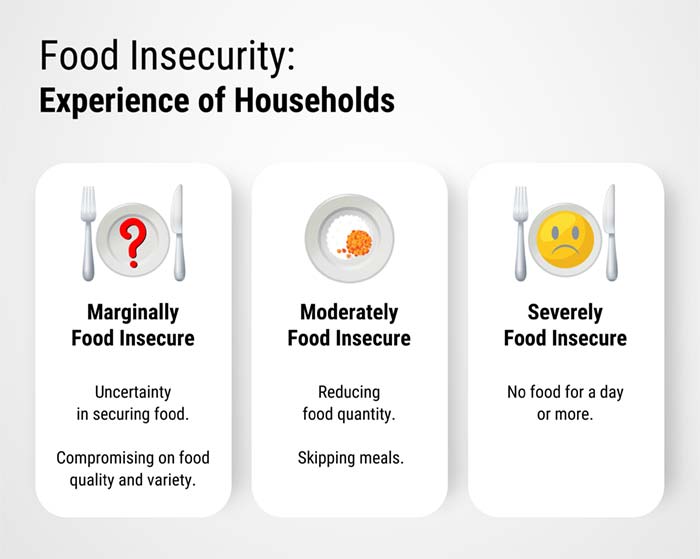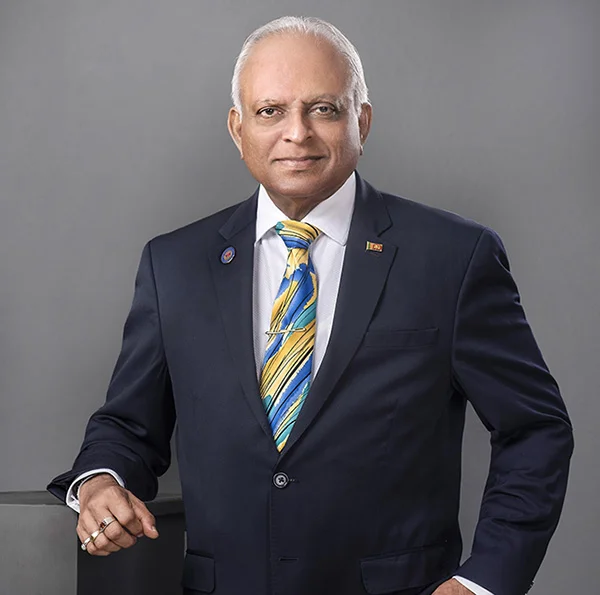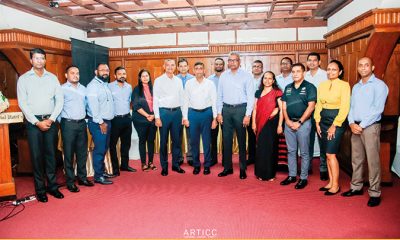Business
Prioritising Child-Friendly Policies: Addressing Sri Lanka’s child malnutrition crisis

By Dr Nisha Arunatilake
Even before the onset of COVID-19, malnutrition stood as a significant driver of multi-dimensional poverty among children in Sri Lanka. Startling data from the Department of Census and Statistics (DCS) in 2019 revealed that one in three children aged 0 to 4 who are multidimensionally poor, are either underweight or stunted. The multiple crises that affected Sri Lanka since 2020 have only exacerbated the already precarious nutrition situation in poor households. This blog argues the need for prioritising social policies focused on children to ensure sustained investment in human capital.
Crisis Impact on Government Initiatives
In response to the pressing nutrition issues in the country, successive governments have introduced several initiatives to maintain the minimum required nutrition levels to ensure unhampered growth and development. However, the crisis affected several of these nutrition programmes, depriving households of access to much-needed social assistance for maintaining nutrition, when it was needed the most.
One such initiative that was adversely affected was the Triposha programme. Triposha is a nutrient-dense food supplement given to pregnant mothers and young children affected by malnutrition. During the crisis, supply chain disruptions and issues of sourcing ingredients necessary for production resulted in a 51% drop in the production of Thriposha in 2020. This resulted in many identified households not receiving nutrition assistance through Triposha.
Another programme adversely affected by the economic crisis was the breakfast programme for preschool (BPS) children. The BOS provides children in selected pre-schools with a daily nutritious breakfast according to the Ministry of Health guidelines. In 2017, a sum of LKR 30 was allocated per child per meal for this programme. Despite high food inflation, this amount was not revised, making it impossible to supply meals as specified by the Ministry of Health.
The Plight of the Urban Poor
A study by the Institute of Policy Studies of Sri Lanka (IPS) finds that the recent economic crisis had devastating effects on the food environment in urban underserved settlements (USSs). According to retail and eatery owners serving these communities, food prices have skyrocketed during the economic crisis. The price of nadu-rice, the cheapest variety of rice in the market, doubled from LKR 100 in August 2021 to LKR 220 in August 2022. The prices of other staples frequently consumed by poor households, like dhal, eggs, dried fish and dried sprats, also increased several folds.
The crisis also reduced the availability of food in the market. The policies introduced by the government to contain the import costs, such as the chemical fertiliser ban and food imports, reduced the variety of food in the market. Further, the vendors were storing less expensive food items in the market as the demand for expensive food items reduced due to low affordability.
As explained by a retail owner in the area:
“I used to stock 50kg of rice earlier, now, I only stock 5kg of rice.”
“We used to keep stocks of green gram and cowpea. But now only one or two customers buy those items, so I do not stock them anymore.”
Coping with Food Inflation
The households in the USSs were using various methods to cope with food inflation. Most stopped eating from outside and reduced buying snacks. Consumption of milk, vegetables, fruits, and meat has all been reduced. One of the main sources of fat for USS residents, coconuts, has also declined during the crisis. As explained by some of the residents:
“We used to drink tea with milk in the morning and afternoon. Now we can only have milk tea in the morning.”
“We used to eat about 250g of vegetables per meal earlier. Now we make the same amount of vegetables last for two meals.”
“We only eat chicken once or twice a week. We try to manage mainly with dried fish and eggs for protein.”
“We rarely eat fruits now. Fruit is expensive. If we buy fruit, we don’t have money for other food.”
“We used to eat about one coconut a day earlier. Now we make one coconut last several days, as the price of coconuts has increased.”
The above findings show that households were either marginally or moderately food insecure during the economic crisis (See infographic). Households in USSs have compromised on food quality and variety, or reduced food consumption due to the crisis.
Conclusion
The findings from Sri Lanka emphasise the pressing issue of child malnutrition, which has only worsened amidst recent crises. Although there are several government initiatives to improve the nutrition levels of children in the country, their operations were severely affected by the economic crisis.
More attention needs to be paid to sustaining the social policies focusing on children, particularly during times of crisis. Only by doing so, we can ensure that children’s development is not compromised due to crisis and that they have the opportunity to thrive, regardless of the adversities they face.
Link to original blog: https://www.ips.lk/talkingeconomics/2023/10/11/prioritising-child-friendly-policies-addressing-sri-lankas-child-malnutrition-crisis/
Dr Nisha Arunatilake is the Director of Research at IPS. She heads the Labour, Employment and Human Resource Development unit at the IPS. Her research interests include labour market analysis, education and skills development, migration and development, and health economics. She holds a BSc in Computer Science and Mathematics summa cum laude from the University of the South, USA and an MA and PhD in Economics from Duke University, USA. (nisha@ips.lk)
Business
War in Middle East sends shockwaves through Sri Lanka’s export sector

Sri Lanka’s export sector is bracing for fresh turbulence as the escalating conflict involving Iran and parts of the Middle East begins to send shockwaves through global trade, shipping and energy markets.
Though geographically distant from the conflict zone, Sri Lanka’s exporters are far from insulated. Industry leaders warn that higher freight costs, rising oil prices and increased trade risks could erode margins and disrupt key markets if hostilities intensify.
President of the National Chamber of Exporters of Sri Lanka, Indhra Kaushal Rajapaksa told The Island Financial Review that the situation is being closely monitored, as the export community is already feeling the early tremors of global instability.
“Sri Lanka may not be directly involved in the conflict, but we are deeply integrated into global supply chains. Any disruption in the Middle East immediately translates into higher costs and operational uncertainty for our exporters,” Rajapaksa said.
A major concern is the vulnerability of critical maritime corridors such as the Strait of Hormuz and the Red Sea, through which a significant share of global trade and oil shipments pass. Shipping lines have begun rerouting vessels and imposing emergency risk surcharges amid mounting security threats, while insurers are reassessing risk exposure in the region.
“Freight costs had only recently begun stabilising after the pandemic-era disruptions. Now, with vessels avoiding high-risk zones and insurers raising premiums, exporters are once again facing unpredictable shipping expenses,” he noted.
For time-sensitive exports such as apparel and perishables, delays could undermine Sri Lanka’s hard-earned reputation for reliability in competitive markets.
Exporters fear that prolonged instability could trigger sustained freight rate hikes similar to those witnessed during previous global disruptions.
The conflict has also driven global oil prices upward on fears of supply disruptions and shipping bottlenecks. Given that the Middle East accounts for a substantial share of global crude oil output, even perceived threats to supply have immediate price implications.
For Sri Lankan exporters, higher oil prices translate directly into increased fuel, electricity and transportation costs. Manufacturing sectors such as apparel, rubber products, plastics and food processing are particularly vulnerable, as energy forms a core input cost across operations.
“Energy is a fundamental cost component in nearly all export industries. When global oil prices rise, the impact cascades through logistics, production and even raw material pricing,” Rajapaksa explained, warning that sustained high energy costs could squeeze already thin margins.
Beyond cost pressures, the Middle East remains a crucial destination for Sri Lankan exports, especially tea and food products. Around 25 percent of Sri Lanka’s tea exports are shipped to Middle Eastern markets, making the region strategically important for the plantation sector.
“The Middle East is not just a transit route; it is a major market. If economic activity slows in those countries, or if banking and payment channels become complicated due to the conflict, our exporters will face direct consequences,” he cautioned.
War conditions also elevate trade finance and insurance risks. Cargo insurance premiums are climbing, and banks may adopt a more cautious stance toward trade credit involving affected regions.
Exporters could face payment delays, tighter financing conditions and higher compliance requirements, raising the overall cost and complexity of doing business.
This comes at a sensitive time for Sri Lanka’s economy, which is navigating recovery. Higher global oil prices would widen the import bill, potentially exerting pressure on the rupee and fuelling domestic inflation. While currency depreciation can sometimes enhance export competitiveness, rising input costs may offset any exchange rate advantage.
Despite the challenges, he pointed to potential opportunities if Sri Lanka responds strategically. As global buyers seek to diversify supply chains away from unstable regions, Sri Lanka could position itself as a reliable sourcing hub for apparel, rubber-based products, processed foods and value-added agricultural goods.
“In every global disruption there are risks, but there are also opportunities. If Sri Lanka strengthens trade facilitation, improves logistics efficiency and ensures policy consistency, we can attract buyers looking for stable alternatives,” he said.
He stressed that resilience and preparedness would be critical in the weeks ahead, as exporters closely watch developments in the Middle East and global energy markets, aware that distant conflicts can swiftly reshape local economic realities.
By Ifham Nizam
Business
Ranil says Iran leadership eviction methodology unacceptable

Ranil Wickremesinghe on Monday criticised the methodology adopted by U.S. President Donald Trump in dealing with Iran, stating that externally driven attempts to dismantle the leadership of another sovereign nation are unacceptable and fraught with dangerous global consequences.
Addressing a group of social media activists at the United National Party (UNP) office on Flower Road, Colombo, Wickremesinghe said that while geopolitical tensions in the Middle East were deepening, the principle of state sovereignty must not be undermined under any circumstances.
Referring to recent escalations between Washington and Tehran and remarks attributed to President Trump concerning Iran’s Supreme Leader Ali Khamenei, Wickremesinghe said:
“President Trump has alleged that Khamenei’s government was responsible for the deaths of hundreds of people in Iran and that action was taken to remove that leadership. However, the methodology used for dismantling the leadership of another administration in such a manner is not acceptable.”
He added that President Trump appeared to be seeking to engage in global affairs “as he likes,” warning that such actions carried far-reaching implications beyond the immediate theatre of conflict.
“What has happened following the Iran strikes is an issue with deep implications,” Wickremesinghe said, noting that the balance of power in sensitive regions must not be disturbed recklessly. Drawing a regional parallel, he observed that control of strategic sea lanes such as the Indian Ocean could not be handed over to a single dominant power.
On the economic fallout, Wickremesinghe sought to allay fears of a severe energy crisis in Sri Lanka. “Amid supply constraints because of Iran, it won’t be a big issue as other oil-producing countries will offer sufficient supplies,” he said. However, he expressed concern over the government’s overall economic management. “I don’t see this ballooning into a significant issue, but my concern is whether the government can manage the economy as it is.”
As he made these comments, the Sri Lankan government has yet to formally articulate its position on the escalating Middle East crisis, and Foreign Minister Vijitha Herath has not publicly clarified the government’s official stance.
Responding to a question on whether he was prepared to assume responsibility for governance again, Wickremesinghe said the present administration must be allowed to discharge its mandate. “Let the government go ahead and address the issues. We shouldn’t let them escape the responsibility they have taken upon themselves,” he said.
Commenting on the 90-day detention of former defence intelligence chief Suresh Saleh in connection with investigations into the 2019 Easter Sunday attacks, Wickremesinghe described the matter as a “closed case.” He pointed out that foreign intelligence agencies, including the Federal Bureau of Investigation (FBI), had already submitted their findings.
“Foreign intelligence bodies such as the FBI have submitted their reports and conclusions. The government’s probe direction is not in line with that. Pursuing the case afresh in this manner is a waste of public money,” he said.
Wickremesinghe’s remarks are particularly noteworthy given the long-standing perception of the UNP as broadly aligned with Western policy positions. During President Trump’s first term, when the U.S. administration threatened to suspend funding to the World Health Organization (WHO) at the height of the COVID-19 pandemic, Wickremesinghe publicly appealed to President Trump to reconsider this move , stating that developing countries such as Sri Lanka would face severe repercussions if global health funding were curtailed.
His latest comments therefore signal a clear defence of diplomatic norms and national sovereignty at a time of rising geopolitical volatility, while underscoring his view that global power rivalries must not override established principles of international conduct.
by Sanath Nanayakkare
Business
Dialog partners with Ratmalana Audiology Centre for World Hearing Day 2026

– Offers free hearing tests throughout March
Dialog Axiata PLC, Sri Lanka’s #1 connectivity provider, marks World Hearing Day 2026 by offering free hearing tests throughout March at the Ratmalana Audiology Centre (RAC), reaffirming its commitment to expanding access to hearing care services across Sri Lanka.
Aligned with the 2026 global theme, “From communities to classrooms: hearing care for all children,” the initiative supports greater awareness of early detection and timely intervention, while making hearing screening services accessible to individuals of all ages. The programme is conducted in partnership with RAC, a collaborative project with the Ceylon School for the Deaf and Blind.
Free hearing tests will be available from 3rd to 31st March between 8:30 AM and 5:00 PM. Screenings are open to the public, including both children and adults, particularly those who may have limited access to hearing healthcare services. Appointments can be scheduled by contacting 011 730 7308 or 077 394 5945.
Over the years, Dialog has invested more than Rs. 70 million in the establishment and ongoing enhancement of RAC, which was set up in 2007 to support students of the Ceylon School for the Deaf and Blind while extending services to the wider community. RAC provides free hearing assessments for individuals referred by Government ENT specialists, alongside speech and language therapy, hearing aid evaluation and fitting, and follow-up rehabilitation services.
-

 Opinion5 days ago
Opinion5 days agoJamming and re-setting the world: What is the role of Donald Trump?
-

 Features5 days ago
Features5 days agoAn innocent bystander or a passive onlooker?
-

 Features2 days ago
Features2 days agoBrilliant Navy officer no more
-

 Features6 days ago
Features6 days agoRatmalana Airport: The Truth, The Whole Truth, And Nothing But The Truth
-

 Opinion2 days ago
Opinion2 days agoSri Lanka – world’s worst facilities for cricket fans
-

 Business6 days ago
Business6 days agoIRCSL transforms Sri Lanka’s insurance industry with first-ever Centralized Insurance Data Repository
-

 Business5 days ago
Business5 days agoAn efficacious strategy to boost exports of Sri Lanka in medium term
-

 Features3 days ago
Features3 days agoOverseas visits to drum up foreign assistance for Sri Lanka




















